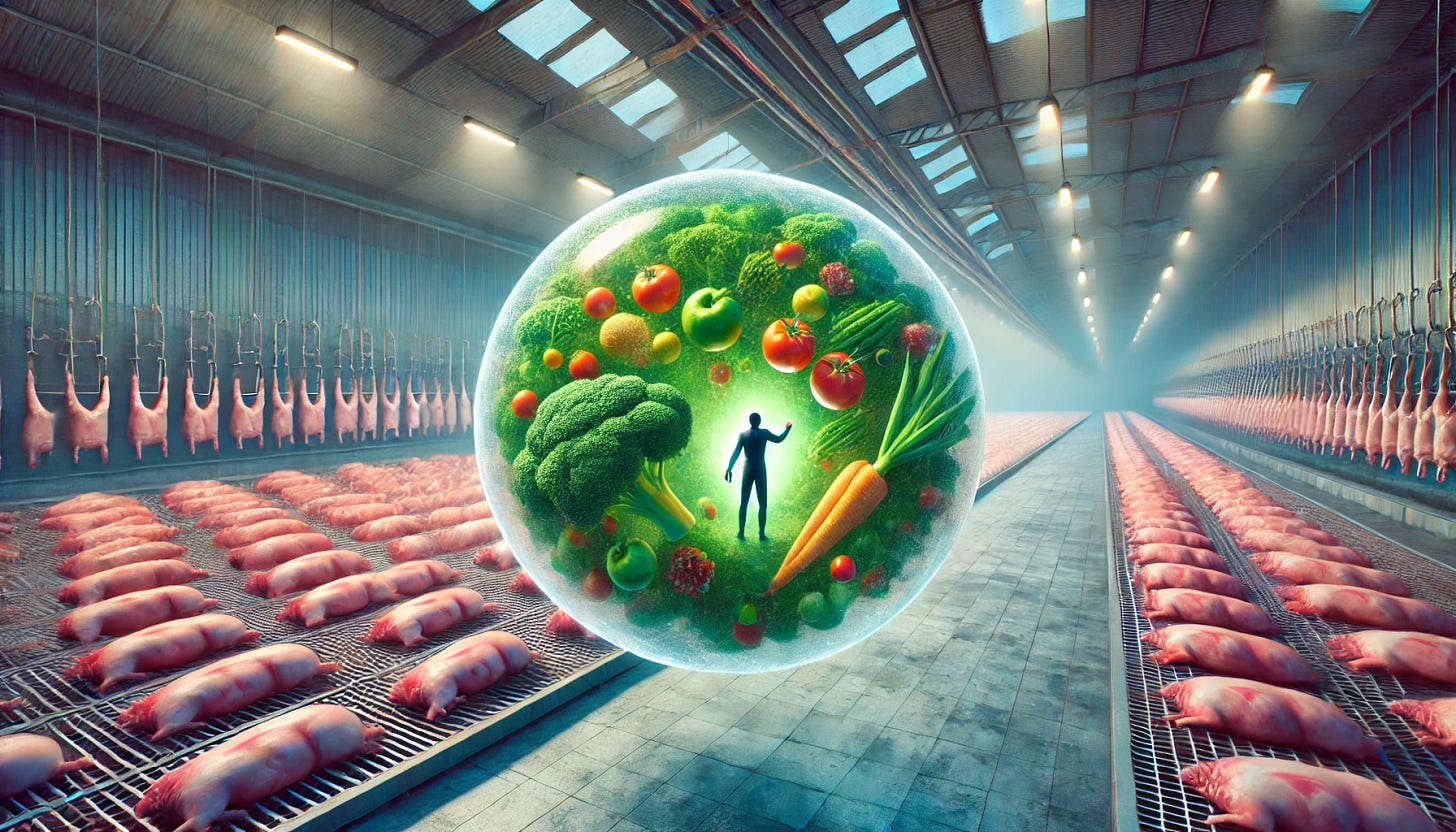Once in a while, someone I know surprises me by eating meat.
At some level, I know that it’s a common thing to do. I’m also aware that some people are into honour killings, throwing trash on the ground, stealing bicycles etc. Knowing that it happens “out there” is one thing — seeing it done by someone I love and trust is different.1
I’ve created a small vegan bubble around me, keeping my home free from animal-based products. Outside of this bubble, meat-eating is seen as normal — “just the way things are”. I need to accept this, even though I find it very odd.
I’ve gone a long time not talking about veganism, even though it’s important to me. I’ve been afraid of coming across as argumentative, going on vegan rants in a way that alienates others.2 Some time ago, I decided that I was going to drop this narrative.
If I don’t talk about it, who will?
Nowadays, when someone asks me if I want to eat animal-based food, I say “nope, I am a militant vegan”, with a smile on my face. When I get asked to elaborate, I say “it means I want everyone to be vegan — maybe blow up the milk factory — but mostly talk to people”.3
I’ve had a lot of beautiful conversions and zero unproductive arguments. Most people I talk to agree that the animal slaughter industry is horrible.4 They tend to shy away from thinking about it, dealing with cognitive dissonance. Others have tried not eating animal products,5 stopping because of health reasons.
No matter where they are, I approach them with curiosity, trying to understand/reflect on where they are at. If they are concerned about health, I give a non-imposing offer to help. If they fall into cognitive dissonance, I empathize and give them space to reflect.
No matter what perspective I take on the meat industry, I find causes of concern — be it climate, health, animal suffering, human suffering,6 pandemic-creation, multi-resistant bacteria, etc. Many people are aware of the situation, but find it hard to change their day-to-day decisions accordingly.
By bringing up these topics in solution-oriented, non-judgemental ways, I hope to shift thinking away from guilt and dissonance — instead empowering people to start taking steps.
In 200 years, I’m confident people will look back on the meat industry, asking themselves questions like “did people know?”, and “why didn’t people do anything?”.
I want to do something.
If you want to go vegan, I recommend weaning yourself off animal-based food gradually. Every week, when shopping for groceries, swap the animal-based food you least enjoy for a plant-based alternative. I transitioned ten years ago — starting by switching from boring lunch chicken to beans.
Every time you want to cook something new, pick up a vegan recipe. You can use chatGPT to help you veganize recipes. When you eat out, save yourself some decision-making energy and ask for the vegan alternative.
Over time, you will be less and less attached to animal-based food — making the eventual “flip” into full veganism less of an ordeal. Transitioning gradually makes each step simple.
Why not start now?
P.S: I’d love to hold space while you reflect on big topics in your life.
Here’s a statement from my client Frans-Lukas, shared with his consent:
“I've attended Jonathan's philosophical guidance sessions four times, and the experience has been transformative. […] I often share the concepts discovered in Jonathan's sessions with my friends, and they've significantly impacted my life.“
I would be very surprised if someone I liked started advocating for murder as a shame-reduction strategy.
Where does this stereotype come from? def psyop
I haven’t made actual plans to blow up the milk factory, it’s a joke
If you want a deep dive, watch Dominion, or read Why We Love Dogs, Eat Pigs, and Wear Cows. Only recommended if you have space for it, and think “is it really that bad?”. Spoiler: it’s worse.
I avoid saying “plant based”, since I eat mushrooms. I’m based, but I’m also vegan. Why do people say “plant based”? def psyop
Can you imagine working as a “knife operator”, tasked with killing animals in a (dis)assembly line fashion? *chop-splash* … *chop-splash* … *chop-splash* … (repeat for a workday, week in and week out). A highly effective way of traumatizing people.




